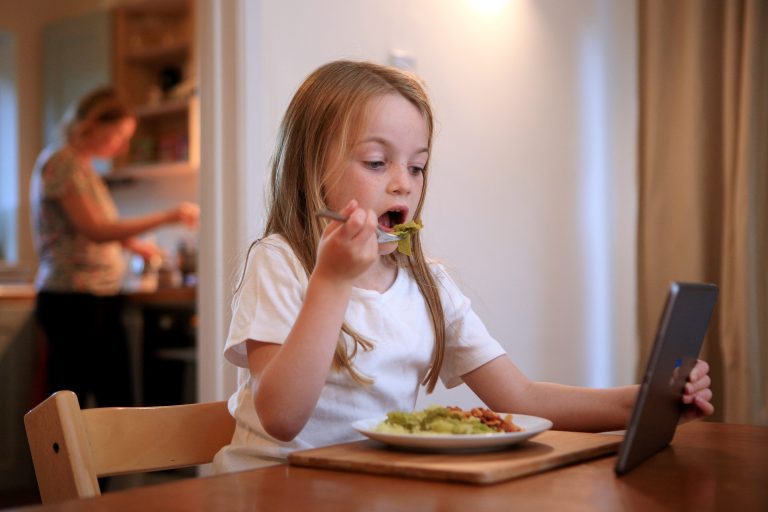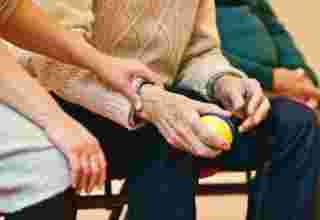
A study of 1,000 parents of 6-16 year olds found 64 per cent felt their children spoke about their feelings more than ever during the lockdown period.
And more than two thirds believe family discussions were more open and honest than they previously were.
Following the return to school, despite 30 per cent being worried about spending less quality time with their youngster, 48 per cent were determined to keep these meaningful conversations going.
But 16 per cent of parents feel they have fewer conversations with their child now they are back at school, with 44 per cent believing their youngster is too tired.
The research, commissioned by McCain as part of its Nation’s Conversations report, also found 38 per cent of parents now feel mealtimes are more important than ever to talk to their child.
Child psychologist Laverne Antrobus said: “As the everyday routines in British households continue to adapt to ever-changing circumstances, it’s unsurprising that families across the nation are worried about how to hold onto quality time together.
“Now more than ever, mealtimes provide moments of stability and normality amidst so many changes to everyday life.
“If children are less vocal following their return to school, then dinner is the perfect time when parents can sit down with them and discuss their thoughts, feelings, hopes and fears.
“The research shows that the majority of parents are determined to keep meaningful conversation going, and mealtimes provide the perfect opportunity to sit together around the dinner table and facilitate this.”
The study also found that during lockdown, parents spent 16 hours of quality time each week with their child.
But this has dropped to 12 hours since the return to school.
Popular topics of discussion while they were at home together included their children’s hopes and fears (27 per cent), their hobbies (36 per cent) and the pandemic (52 per cent).
Although following their children’s return to their 9 ‘til 3 routines, 57 per cent of mums and dads think the nature of their talks has changed.
And conversations are now likely to take place at the dinner table according to 64 per cent, while 57 per cent catch up with their kids at the weekends.
It also emerged 28 per cent of parents feel their youngster has formed better bonds with their siblings in recent months, while 24 per cent of adults now speak more openly with their other half.
The research, carried out via OnePoll, also polled 1,000 6-16 year olds and found 61 per cent have missed spending time with – and talking to – their parents since being back at school.
A further nine in 10 said they enjoy their family mealtimes and 80 per cent look forward to using the time to catch up with their parents and siblings.
A fifth feel sad about having fewer conversations with their mum and dad, but 70 per cent had missed talking with other children and 79 per cent were excited to catch up with their friends.
Mark Hodge, from McCain, said: “We know that eating around the table makes mealtimes special and over the years this family moment has been a place for healthy debate, wide ranging conversations and even the odd disagreement.
“Bringing families together at home couldn’t be more important, especially in the midst of the crisis we are all facing with Coronavirus and as we continue to adapt to new routines, whatever they may look like for households across the nation.
“It’s therefore incredibly important that in these unprecedented and challenging times, we use dinner time to open up with one another.
“Mealtimes provide a sense of normality and the dinner table is at the centre of togetherness.”

Stock photo of a modern meal time – with a child eating whilst using an iPad and her mother still in the kitchen. See SWNS story SWMEAL: British family mealtimes are now a staggered affair – with mums serving tea up to three times a day, a study has found. More than half of modern families no longer sit down to dinner together on a week day instead the children will eat together in one sitting at around 5:45pm, while mum and dad will try to eat together at least three days a week. And when the children do sit down to eat, only four in 10 make it to the kitchen table. The McCain Teatime Report showed a third of kids are served their tea on the sofa or in front of the television, while almost one in 10 eat in their bedroom. Mark Hodge, Marketing Director at McCain, which commissioned the research, said: Teatimes have changed considerably over the last 30 years.

Stock photo of a modern meal time – with a child eating while using an iPad and her mother still in the kitchen. See SWNS story SWMEAL: British family mealtimes are now a staggered affair – with mums serving tea up to three times a day, a study has found. More than half of modern families no longer sit down to dinner together on a week day instead the children will eat together in one sitting at around 5:45pm, while mum and dad will try to eat together at least three days a week. And when the children do sit down to eat, only four in 10 make it to the kitchen table. The McCain Teatime Report showed a third of kids are served their tea on the sofa or in front of the television, while almost one in 10 eat in their bedroom. Mark Hodge, Marketing Director at McCain, which commissioned the research, said: Teatimes have changed considerably over the last 30 years.
jQuery(document).ready(function($) {
// We only want these styles applied when javascript is enabled
$(‘.gal_content’).css(‘display’, ‘block’);
// Initialize Advanced Galleriffic Gallery
var gallery = $(‘#thumbs_42244_2’).galleriffic({
delay: 3500,
numThumbs: 12,
preloadAhead: 12,
enableTopPager: false,
enableBottomPager: false,
imageContainerSel: ‘#slideshow_42244_2’,
controlsContainerSel: ‘#controls_42244_2’,
captionContainerSel: ‘#caption_42244_2’,
loadingContainerSel: ‘#loading_42244_2’,
renderSSControls: true,
renderNavControls: false,
playLinkText: ‘Play Slideshow’,
pauseLinkText: ‘Pause Slideshow’,
enableHistory: 0,
autoStart: 0,
enableKeyboardNavigation: true,
syncTransitions: false,
defaultTransitionDuration: 300,
onTransitionOut: function(slide, caption, isSync, callback) {
slide.fadeTo(this.getDefaultTransitionDuration(isSync), 0.0, callback);
caption.fadeTo(this.getDefaultTransitionDuration(isSync), 0.0);
},
onTransitionIn: function(slide, caption, isSync) {
var duration = this.getDefaultTransitionDuration(isSync);
slide.fadeTo(duration, 1.0);
// Position the caption at the bottom of the image and set its opacity
var slideImage = slide.find(‘img’);
caption.fadeTo(duration, 1.0);
},
onPageTransitionOut: function(callback) {
//this.hide();
setTimeout(callback, 100); // wait a bit
},
onPageTransitionIn: function() {
var prevPageLink = this.find(‘a.prev’).css({‘opacity’: ‘0.3’ , ‘display’ : ‘inline-block’, ‘cursor’ : ‘default’});
var nextPageLink = this.find(‘a.next’).css({‘opacity’: ‘0.3’ , ‘display’ : ‘inline-block’, ‘cursor’ : ‘default’});
// Show appropriate next / prev page links
if (this.displayedPage > 0)
prevPageLink.css({‘opacity’ : ‘1’ , ‘display’ : ‘inline-block’, ‘cursor’ : ‘pointer’});
var lastPage = this.getNumPages() – 1;
if (this.displayedPage < lastPage)
nextPageLink.css({'opacity' : '1' , 'display' : 'inline-block', 'cursor' : 'pointer'});
this.fadeTo('fast', 1.0);
}
});
/**************** Event handlers for custom next / prev page links **********************/
gallery.find('a.prev').click(function(e) {
gallery.previousPage();
e.preventDefault();
});
gallery.find('a.next').click(function(e) {
gallery.nextPage();
e.preventDefault();
});
});
ENDS


















